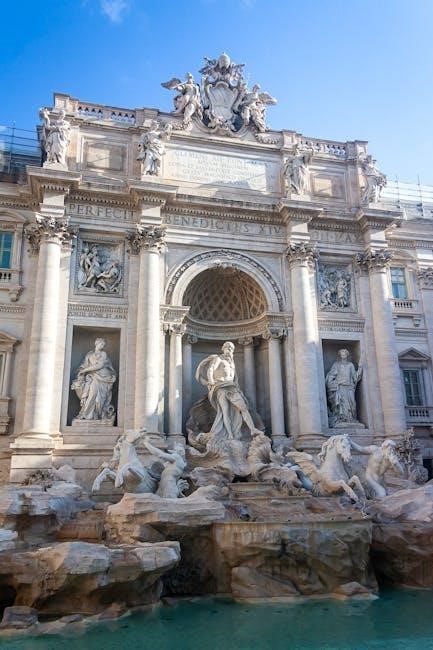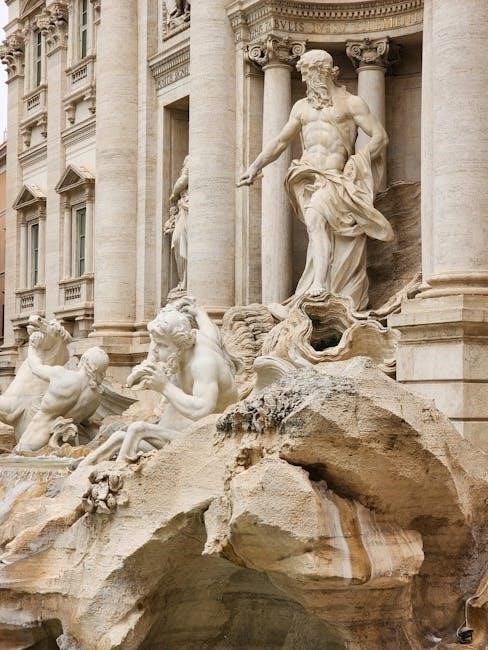Rick Riordan’s The Son of Neptune captivates readers with its blend of Roman mythology‚ thrilling quests‚ and Percy Jackson’s memorable journey alongside Hazel and Frank.

1.1 Overview of the Book Series
The Heroes of Olympus is a captivating series by Rick Riordan‚ blending Greek and Roman mythologies. It follows demigods like Percy Jackson‚ Hazel‚ and Frank as they embark on quests to save the world. The series is known for its engaging storytelling‚ character growth‚ and rich mythological references. The Son of Neptune stands out as a pivotal installment‚ exploring themes of identity and friendship while expanding the universe of demigod adventures. Its popularity endures among young adult readers worldwide.

1.2 The Significance of “The Son of Neptune” in the Series
The Son of Neptune is a pivotal book in The Heroes of Olympus series‚ marking Percy Jackson’s return and his integration into the Roman demigod world. It explores themes of identity and unity‚ as Percy‚ Hazel‚ and Frank embark on a quest to free Death and unite Greek and Roman camps. The book’s unique blend of Roman mythology and character development sets the stage for the Prophecy of Seven‚ making it a cornerstone of the series’ progression and a fan favorite for its emotional depth and action-packed narrative.
1.3 Rick Riordan’s Writing Style and Popularity
Rick Riordan’s writing captivates with its unique blend of mythology and modern life‚ creating relatable characters like Percy Jackson. His engaging style and character depth have earned him multiple awards and a loyal fan base. Riordan’s ability to make mythology accessible has made his books‚ including The Son of Neptune‚ favorites among readers of all ages‚ solidifying his place in young adult literature.

Plot Summary of “The Son of Neptune”
Percy Jackson‚ with amnesia‚ joins Hazel and Frank on a quest to free Death‚ unite Greek and Roman camps‚ and fulfill the Prophecy of Seven.
2.1 The Quest to Free Death
Percy‚ Hazel‚ and Frank embark on a perilous journey to free Death‚ held captive by Gaia’s forces. Their quest involves navigating treacherous landscapes‚ battling fearsome monsters‚ and solving riddles. The trio faces challenges like the Doors of Death and encounters with powerful beings such as Polybotes. This mission is crucial for restoring balance to the demigod world and fulfilling the Prophecy of Seven‚ making it a pivotal moment in the series.
2.2 The Union of Greek and Roman Camps
The union of Greek and Roman camps is a central theme‚ as Percy’s actions help bridge the divide between the two. Initially‚ Romans view Percy with suspicion due to his Greek upbringing and amnesia. However‚ through shared challenges and mutual respect‚ the camps begin to unite. This alliance is crucial for fulfilling the Prophecy of Seven and combating Gaia’s forces. The union symbolizes overcoming centuries of rivalry‚ showcasing the strength of collaboration in the face of greater threats.
2.3 Percy’s Journey and Character Development
Percy’s journey in The Son of Neptune showcases his vulnerability and growth. Suffering from amnesia‚ he must rebuild his identity and trust in others. His interactions with Hazel and Frank highlight his ability to form strong bonds‚ even without his memories. The final battle reveals his resilience and cleverness‚ as he outsmarts the giant using Terminus. This book emphasizes Percy’s development beyond his relationship with Annabeth‚ focusing on his personal strength and leadership‚ making it a standout in his character arc.
2.4 The Role of Hazel and Frank in the Quest
Hazel and Frank play pivotal roles in the quest‚ bringing unique strengths. Hazel’s ability to control precious stones and her mysterious past add depth‚ while Frank’s shape-shifting and loyalty provide crucial support. Their bond with Percy grows as they face challenges‚ showcasing their resilience and teamwork. Frank’s fatal flaw and Hazel’s determination highlight their humanity‚ making their contributions indispensable to the mission’s success and the story’s emotional depth.
Character Analysis
Percy‚ Hazel‚ and Frank’s dynamic evolves through their quest‚ revealing their strengths and vulnerabilities. Their interactions highlight loyalty‚ courage‚ and growth‚ enriching the story’s emotional landscape.
3.1 Percy Jackson: His Struggles and Growth
Percy faces amnesia and adapting to Roman demigods‚ showcasing his resilience. His journey with Hazel and Frank highlights his growth‚ as he confronts identity and belonging themes‚ proving his strength beyond his memory loss and fostering deep bonds with his new allies.
3.2 Hazel Levesque: Her Background and Powers
Hazel‚ daughter of Pluto‚ possesses the ability to control precious metals and gems. Her resurrection by her father grants her unique powers‚ though it burdens her with a tragic past. Her connection to the Sibyl‚ Phineas‚ adds depth to her role in the quest. Hazel’s strength lies in her resilience and loyalty‚ as she navigates her complex identity and the weight of her resurrection‚ proving herself indispensable to the group’s success.
3.3 Frank Zhang: His Loyal and Protective Nature
Frank Zhang‚ a Roman demigod and son of Mars‚ embodies loyalty and protectiveness. His unwavering dedication to his friends‚ particularly Percy and Hazel‚ drives his actions. Frank’s leadership skills and strategic thinking are crucial to their quest. His deep sense of responsibility often leads him to put others’ needs before his own‚ showcasing his selfless nature. Frank’s journey highlights his growth from a timid hero to a confident leader‚ making him a beloved and integral character in the story.
3.4 The Dynamics Between Percy‚ Hazel‚ and Frank
The bond between Percy‚ Hazel‚ and Frank is forged through trust and shared adversity. Percy’s amnesia and Hazel’s mysterious past create a foundation of mutual understanding. Frank’s loyalty and protective nature complement Percy’s leadership‚ while Hazel’s wisdom and magical abilities provide balance. Their dynamic evolves from initial wariness to deep camaraderie‚ showcasing how diverse personalities can unite for a common cause. This trio’s interactions are heartfelt and pivotal‚ making their friendship a highlight of the story.

Themes and Motifs
Themes in The Son of Neptune include identity‚ friendship‚ loyalty‚ and destiny‚ with a focus on the clash between Greek and Roman mythologies‚ enriching the narrative deeply.
4.1 Identity and Belonging
Percy’s amnesia and journey in The Son of Neptune explore themes of identity and belonging. His memory loss forces him to redefine himself‚ while his interactions with Hazel and Frank highlight the importance of found family. The Roman camp’s perspective on Percy’s actions underscores his struggle to fit into a world where his Greek heritage clashes with Roman traditions‚ creating a unique dynamic of self-discovery and acceptance.
4.2 Friendship and Loyalty
The bonds of friendship and loyalty shine brightly in The Son of Neptune. Percy‚ Hazel‚ and Frank form a resilient trio‚ relying on each other’s strengths to overcome challenges. Their loyalty is tested as they face life-threatening quests‚ with Percy’s amnesia adding depth to their trust and camaraderie. The novel highlights how true friendship transcends personal struggles‚ as they risk everything to protect one another and fulfill their destiny together.
4.3 Prophecies and Destiny
The Prophecy of Seven drives the narrative‚ shaping the characters’ actions and futures. Percy‚ Hazel‚ and Frank are destined to unite Greek and Roman demigods‚ their roles intertwined by fate. The prophecy’s ambiguity creates tension‚ as they navigate challenges while questioning their free will. Rick Riordan masterfully weaves destiny into the plot‚ highlighting the struggle between predetermined paths and personal choices‚ making the characters’ journeys both compelling and emotionally resonant.
4.4 The Clash of Greek and Roman Mythologies
The book explores the fascinating tension between Greek and Roman mythologies‚ highlighting their differences in beliefs and practices. Roman demigods view Percy’s casual interactions with gods as disrespectful‚ contrasting sharply with Greek customs. This cultural clash adds depth to the story‚ as characters navigate their identities and alliances. The union of the camps becomes crucial‚ blending these mythological worlds to counter the rising threat of Gaia and her giants‚ showcasing Riordan’s skill in merging diverse mythological elements seamlessly.

Mythological Elements
The book delves into Roman mythology‚ featuring Gaia‚ powerful giants‚ and Camp Jupiter. Mythological creatures and monsters add depth‚ enriching the story’s fantastical world.
5.1 Roman Mythology in the Book
The Son of Neptune deeply explores Roman mythology‚ introducing Camp Jupiter‚ the Roman demigod base; The story features Gaia‚ the earth goddess‚ and her awakening of powerful giants. Roman gods like Terminus and their distinct cultural practices are highlighted‚ contrasting with Greek traditions. Percy’s interactions with Roman deities showcase the differences in their expectations and behaviors. The book seamlessly integrates Roman mythological elements‚ enhancing the narrative’s richness and depth while staying true to Riordan’s engaging storytelling style.
5.2 The Role of Gaia and the Giants
Gaia‚ the Roman earth goddess‚ plays a pivotal role in The Son of Neptune by awakening powerful giants to overthrow the Olympian gods. These giants‚ born from the earth‚ pose a significant threat to both Greek and Roman demigods. Gaia’s influence drives the plot‚ as Percy‚ Hazel‚ and Frank must confront these formidable foes. The giants’ awakening escalates the conflict‚ highlighting the fragility of peace between the gods and mortals. Their presence underscores the looming prophecy and the heroes’ daunting task to restore balance.
5.3 The Significance of Camp Jupiter
Camp Jupiter‚ the Roman demigod haven‚ serves as a central hub for Roman mythology in The Son of Neptune. Unlike Camp Half-Blood‚ it reflects Roman discipline and structure‚ emphasizing loyalty to the state. The camp’s leadership and traditions highlight cultural differences between Greek and Roman demigods. Percy’s arrival sparks curiosity and suspicion‚ as Romans view his interactions with gods as disrespectful. Camp Jupiter’s role is crucial in uniting Greek and Roman forces‚ showcasing its importance in the broader quest to fulfill the Prophecy of Seven.
5.4 Mythological Creatures and Monsters
In The Son of Neptune‚ Rick Riordan introduces a variety of mythological creatures and monsters‚ blending Roman and Greek mythologies. Gaia’s awakening unleashes fearsome giants like Polybotes‚ while other creatures such as Cyclopes and harpies add depth to the story. The memory-eating Phineas and the terrifying Amalthea also play significant roles. These creatures not only challenge Percy‚ Hazel‚ and Frank but also highlight the richness of mythological lore‚ making the quest more perilous and engaging for readers.
Reception and Reviews
The Son of Neptune received widespread acclaim for its engaging plot‚ character depth‚ and mythological richness. Fans praised Percy’s vulnerability and growth‚ while critics noted its high ratings and seamless blend of humor and action‚ solidifying its place as a fan-favorite in the series.
6.1 Fan Reactions and Favourite Moments
Fans praised The Son of Neptune for its emotional depth and Percy’s relatable struggles. The bond between Percy‚ Hazel‚ and Frank resonated deeply‚ with many highlighting their dynamic as a series highlight. The climactic battle with the giant‚ using Terminus’ magic‚ was a fan-favorite moment. Readers also appreciated Frank’s character development and the humor in Percy’s interactions with Roman gods. The book’s ability to balance action‚ humor‚ and heart solidified its place as a beloved installment in the series.
6.2 Critical Acclaim and Ratings
The Son of Neptune received widespread critical acclaim for its engaging storytelling and character depth. Critics praised Rick Riordan’s ability to weave Roman mythology seamlessly into the narrative. The book holds a 4.7-star rating on platforms like Amazon‚ with reviewers highlighting its fast-paced action and emotional resonance. Many noted how Percy’s vulnerability and growth added layers to his character. The novel’s success solidified its place as a standout in the Heroes of Olympus series‚ earning it a spot on several bestseller lists.
6.3 Comparisons with Other Books in the Series
Fans and critics often compare The Son of Neptune favorably with other books in the Heroes of Olympus series. Many argue it surpasses The Lost Hero in depth and pacing. Percy’s character development is particularly praised‚ with his amnesia arc adding unique complexity. The dynamic between Percy‚ Hazel‚ and Frank is often highlighted as one of the strongest friendships in the series. Some fans‚ however‚ feel the book’s climax‚ while thrilling‚ doesn’t quite match the epic scale of later installments like The Blood of Olympus.
6.4 The Book’s Impact on the Series’ Continuity
The Son of Neptune plays a pivotal role in advancing the Heroes of Olympus series. It successfully bridges the Greek and Roman demigod worlds‚ setting the stage for the Prophecy of Seven. Percy’s journey in this book lays the groundwork for his character development in later installments. The introduction of Hazel and Frank also adds depth to the series’ ensemble cast. Their quest to free Death and unite the camps ensures the story’s momentum‚ making this book a cornerstone of the series’ overarching narrative.

Adaptations and Related Media
The Son of Neptune has been adapted into a graphic novel‚ with vibrant illustrations bringing the story to life. Audiobook versions‚ narrated by Robbie Daymond‚ offer an immersive experience. Fan art and fan fiction inspired by the book thrive online‚ showcasing its cultural impact. These adaptations and creative interpretations highlight the book’s enduring popularity and influence on pop culture.
7.1 Graphic Novel Adaptations
The graphic novel adaptation of The Son of Neptune‚ illustrated by Nilah Magruder‚ brings the story to life with vibrant visuals and dynamic panel layouts. Published by Disney-Hyperion‚ it captures the essence of Percy’s journey‚ Hazel’s powers‚ and Frank’s loyalty. The adaptation retains the original’s humor and action‚ making it a hit among fans. Its success has led to further graphic novel adaptations of other books in the series‚ ensuring Riordan’s world reaches a broader audience through this engaging visual medium.
7.2 Audiobook Versions and Narration
The audiobook of The Son of Neptune‚ narrated by Robbie Daymond‚ captivates listeners with its dynamic storytelling. Daymond’s voice brings depth to Percy‚ Hazel‚ and Frank‚ enhancing the emotional and action-packed moments. His engaging tone ensures the humor and tension of Riordan’s writing shine through‚ making the audiobook a compelling choice for fans. The narration seamlessly transitions between characters‚ immersing listeners in the world of Roman mythology and the quest to unite the camps‚ offering a fresh way to experience the story.
7.3 Fan Art and Fan Fiction Inspired by the Book
Fans of The Son of Neptune have created vibrant fan art and engaging fan fiction‚ showcasing their love for Percy‚ Hazel‚ and Frank. Artwork often depicts key scenes‚ like the trio’s quest or battles with monsters‚ while fan fiction explores alternate storylines and deepens character relationships. Platforms like DeviantArt and Tumblr host these creations‚ highlighting the book’s impact on the fan community. The stories and art reflect the themes of friendship and adventure‚ inspiring new interpretations of Riordan’s world.
7.4 The Book’s Influence on Pop Culture
The Son of Neptune has left a lasting mark on pop culture‚ inspiring countless fan creations and discussions. Its unique blend of Roman mythology and modern adventure has sparked interest in classical education and influenced young adult literature. The book’s themes of identity and friendship resonate widely‚ making it a favorite among readers and critics alike. Its impact extends beyond literature‚ shaping how mythology is perceived in media and fostering a vibrant fan community that celebrates its storytelling and characters.
The Author’s Perspective
Rick Riordan masterfully blends Roman mythology with modern adventure‚ creating a compelling narrative that explores identity‚ friendship‚ and destiny‚ while maintaining his signature engaging storytelling style.
8.1 Rick Riordan’s Inspiration for the Book
Rick Riordan drew inspiration from Roman mythology‚ exploring its unique traditions and contrasts with Greek demigod lore. He aimed to expand Percy Jackson’s world by introducing Roman characters like Hazel and Frank‚ while delving into themes of identity and unity. The idea of uniting Greek and Roman camps stemmed from his interest in historical tensions between the two cultures. Riordan also wanted to challenge Percy with amnesia‚ creating a fresh‚ vulnerable perspective for his character. This approach allowed for deeper character development and a richer narrative.
8.2 His Approach to Character Development
Rick Riordan excels at crafting relatable characters by exploring their vulnerabilities and strengths. In The Son of Neptune‚ Percy’s amnesia serves as a tool to rebuild his identity‚ making him more accessible to readers. Riordan emphasizes the importance of friendships‚ as seen in Percy’s bonds with Hazel and Frank‚ which drive the story’s emotional core. Each character’s unique background and struggles‚ such as Frank’s loyalty and Hazel’s mysterious past‚ add depth and complexity‚ ensuring their growth resonates throughout the narrative.
8.3 The Challenges of Writing “The Son of Neptune”
Rick Riordan faced challenges in blending Greek and Roman mythologies seamlessly while maintaining Percy’s voice. The amnesia plotline required careful handling to avoid alienating fans familiar with Percy’s past. Balancing action with emotional depth‚ particularly in Percy’s bonds with Hazel and Frank‚ added complexity. Additionally‚ ensuring the book’s continuity within the series while introducing new characters and lore demanded meticulous planning‚ showcasing Riordan’s skill in crafting a compelling narrative that resonates with readers of all ages.
8.4 Riordan’s Views on the Book’s Success

Rick Riordan expressed satisfaction with The Son of Neptune’s reception‚ noting its ability to deepen Percy’s character and expand the mythological universe. Fans praised the book’s unique blend of Roman mythology and emotional depth‚ while critics highlighted its seamless integration into the series. Riordan emphasized the importance of balancing action with character growth‚ particularly in Percy’s journey. The book’s success‚ he believes‚ lies in its ability to resonate with both new readers and long-time fans‚ solidifying its place in the series.

Cultural and Educational Impact
The Son of Neptune has inspired a renewed interest in classical mythology‚ making it a valuable tool for educational programs focused on ancient cultures and literature;
9.1 The Book’s Role in Promoting Classical Education
The Son of Neptune bridges mythology and modern storytelling‚ fostering interest in classical studies. Its vivid portrayal of Roman and Greek mythologies makes ancient tales relatable and engaging for young readers.
Schools and educators often use the book to teach mythology‚ history‚ and literature‚ highlighting its educational value. Riordan’s approach sparks curiosity‚ encouraging students to explore classical cultures and their legacies in a fun‚ accessible way.
9.2 Its Influence on Young Adult Literature
The Son of Neptune has significantly impacted young adult literature by blending mythology with modern teen experiences‚ appealing to a wide audience. Its success helped popularize mythological fiction‚ inspiring other authors to explore similar themes. The book’s relatable characters and fast-paced plot set a high standard for engaging young readers‚ making it a cornerstone in the fantasy genre and a key influence in shaping contemporary young adult storytelling.
9.3 The Book’s Use in Schools and Libraries
The Son of Neptune is widely used in schools and libraries for its educational value‚ blending mythology with engaging storytelling. It supports classical education by introducing students to Roman and Greek myths. Libraries often feature the book in young adult sections‚ and educators recommend it for its ability to spark interest in history and literature. Its inclusion in school curriculums highlights its role in fostering a love for reading and learning among students.
9.4 Its Contribution to the Fantasy Genre
The Son of Neptune revitalizes the fantasy genre by blending Roman and Greek mythology with modern storytelling. Its unique approach to mythological themes appeals to a broad audience‚ inspiring new perspectives on classical tales. The book’s success has influenced young adult literature‚ encouraging authors to explore mythological narratives. By weaving adventure‚ humor‚ and relatable characters‚ Riordan’s work has left a lasting impact on the fantasy genre‚ making it a cornerstone of contemporary young adult fiction.
The Son of Neptune stands as a pivotal installment in The Heroes of Olympus series‚ offering a fresh perspective on mythology and leaving a lasting impact on young adult fantasy literature.
10;1 The Legacy of “The Son of Neptune”
The Son of Neptune leaves a lasting legacy as a standout in The Heroes of Olympus series‚ blending Roman mythology with Percy Jackson’s compelling journey. Its unique storytelling‚ character growth‚ and memorable trio of Percy‚ Hazel‚ and Frank resonate deeply with fans. The book’s fresh take on mythology and its impact on the fantasy genre solidify its place in young adult literature. It also plays a key role in promoting classical education‚ making it a cherished and influential read.
10.2 Its Place in the “Heroes of Olympus” Series
The Son of Neptune is a pivotal installment in The Heroes of Olympus series‚ serving as the second book and building on the events of The Lost Hero. It deepens the unity between Greek and Roman demigods‚ essential for fulfilling the Prophecy of Seven. Fans praise its unique storytelling‚ character dynamics‚ and the fresh perspective it brings to Percy Jackson’s journey. The book seamlessly integrates Roman mythology‚ making it a standout installment that bridges the gap between the series’ beginning and its epic conclusion.
10.3 Final Thoughts on the Book’s Significance
The Son of Neptune holds a special place in the Heroes of Olympus series‚ offering a fresh perspective on Percy Jackson’s journey while deepening the bond between Greek and Roman demigods. Its unique blend of Roman mythology‚ character growth‚ and emotional depth makes it a fan favorite. The book’s ability to balance humor‚ action‚ and heartfelt moments underscores its lasting impact on the series and its readers‚ solidifying its importance in the Percy Jackson universe.